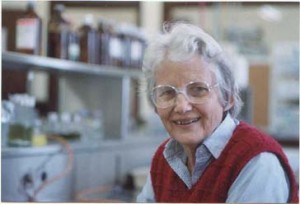
Johanna Döbereiner
Johanna Döbereiner was born on November 28, 1924 in Czechoslovakia. She studied Agronomy at the University of Munich, emigrating to Brazil in 1951, where she began working at the Soil Microbiology Laboratory of the former DNPEA of the Ministry of Agriculture, located in Seropédica. She became a Brazilian citizen in 1956, and completed her postgraduate studies at the University of Wisconsin in 1963. In 1995, Johanna Döbereiner became an honorary member of the SBCS during the XXV Brazilian Congress of Soil Science.
From 1963 to 1969, when few scientists believed that biological nitrogen fixation (BNF) could compete with mineral fertilizers, Johanna Döbereiner, leading a group of students, began a research program on the limiting aspects of BNF in tropical legumes. Since then, most research in this area in tropical regions has been influenced in some way by Dr. Döbereiner’s discoveries.
The Brazilian soybean breeding program, which began in 1964, was also influenced by her work, among others, and became the most successful soybean breeding program entirely based on the BNF process. Without the use of nitrogen fertilizers, Brazil was able to compete successfully in the international market, becoming the world’s second largest soybean producer.
The energy crisis renewed interest in BNF research and, by extension, in the associations between grasses and diazotrophic microorganisms. Johanna Döbereiner was at the center of these studies, from the initial discoveries of the occurrence of Azotobacter paspali in association with Paspalum notatum roots, to the associations of several diazotrophic bacteria in endophytic symbiosis with grasses and tuberous species. These studies led to the discovery of nine species of diazotrophic bacteria associated with grasses, cereals and tubers.




